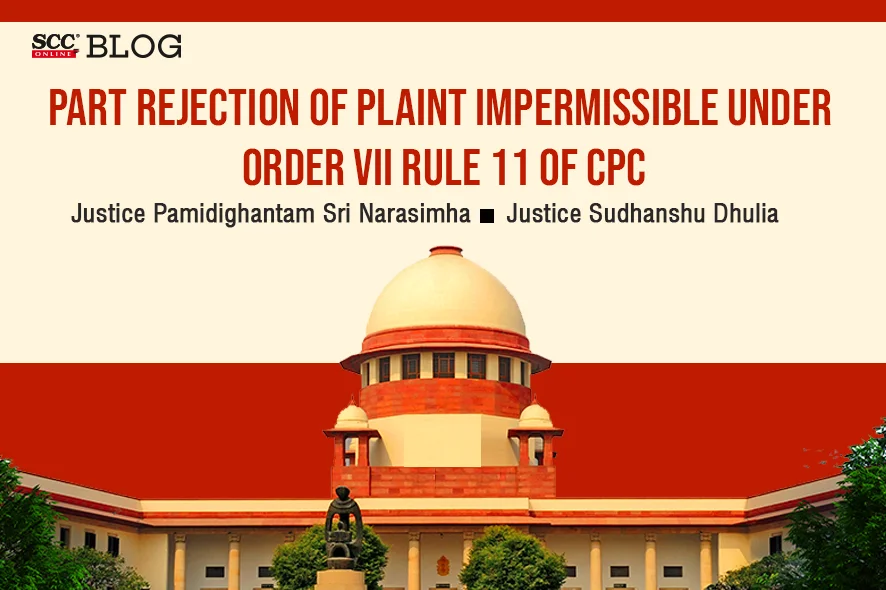Supreme Court: In an appeal involving question regarding correct application of the principle underlying the ‘rejection of plaints’ under Order VII Rule 11 of Civil Procedure Code, 1908 (‘CPC’) and legality of rejection of a plaint in part, the Division Bench of Pamidighantam Sri Narasimha and Sudhanshu Dhulia, JJ. set aside Karnataka High Court’s judgment and order dated 9-11-2015 to hold that application for part rejection of plaint under Order VII Rule 11 of CPC could not be allowed.
Factual Matrix
It was averred that the Karta of the joint family had many properties who was habitual to temporarily mortgaging properties for raising finances by executing ‘nominal sale deeds’, and that once dues were cleared, reconveyance deeds were executed, and the said practice was for maintaining the family, and the persons in whose favour those documents were executed were also close acquaintances of the family, and thus, none of the joint family properties’ possession was ever parted. When plaintiffs asked for partition, the defendants instead of denying asked them to wait until revenue records were updated for effecting actual partition, which led the plaintiffs to present a plaint for partition and separate possession.
4 years after the said partition suit was filed, the defendants filed a petition seeking rejection of plaint under Order VII Rule 11 of CPC, which was dismissed by the Trial Court on ground of plaint disclosing a cause of action, but the High Court observed that the schedule property was sold in 1919 via registered sale deed, allowed the application under Order VII Rule 11 in part while rejecting the plaint for scheduled property with the reason that the plaintiffs did not deny the sale but mentioned subsequent re-conveyancing of property back to the joint family without corresponding mutation of revenue records.
Court’s Analysis of Law around Order VII Rule 11 of CPC
The Court referred to Dahiben v. Arvindbhai Kalyanji Bhanusali, (2020) 7 SCC 366 for succinctly explained relevant principles under Order 7 Rule 11 and explained that “the true test is first to read the plaint meaningfully and as a whole, taking it to be true. Upon such reading, if the plaint discloses a cause of action, then the application under Order VII Rule 11 of the CPC must fail. To put it negatively, where it does not disclose a cause of action, the plaint shall be rejected.”
Instant Case
The Court went on to consider the averments made by the plaint to observe that the plaintiffs specifically pleaded regarding execution of various sales through ‘nominal sale deeds’, which were not acted upon. It further acknowledged the specific address of issue regarding revenue records in the plaint of the joint family property, with averments of the joint family continuing to be in undisrupted possession of the property, though the RTC records stood in the financiers’ name.
The Court stated that “If the statements in the plaint are taken to be true, the joint family properties may enure to the benefit of its members, and they may well be available for partition.” The Court regarded the same to be a matter of trial depending upon evidence adduced by the plaintiff and went on to state that the plaintiffs had the carriage of the proceedings for discharging heavy burden of proving their case. It also highlighted the High Court’s error in examining the merits of the instant case, pre-judging the truth, legality and validity of the sale deed with defendants claiming the title. The Court cautiously remarked that it did not mean that the plaintiffs had any less burden to prove their case or if their case was probable, but the High Court could not have anticipated the truth of averments by assuming that the alleged previous sale of the property was complete or was acted upon.
Part Rejection of Plaint
The Court expressed that “The approach adopted by the High Court is incorrect and contrary to the well-entrenched principles of considering an application under Order VII Rule 11 of CPC”. It further questioned the sustainability of the impugned order and pointed out to reiterate that an application under Order VII Rule 11, CPC a plaint could not be rejected in part, a principle well established and continuously followed since 1936 after decision in Maqsud Ahmad v. Mathra Datt & Co., 1936 SCC OnLine Lah 337. The same was also explained in Sejal Glass Ltd. v. Navilan Merchants (P) Ltd., (2018) 11 SCC 780 and followed in Sejal Glass Ltd. v. Navilan Merchants (P) Ltd., (2018) 11 SCC 780. The Court said that the High Court erred in rejecting the plaint in part with respect to scheduled property, permitting the plaintiffs to prosecute the case with respect to other properties, an approach which was impermissible while considering an application under Order VII Rule 11 of CPC.
Conclusion
The Court held that the High Court committed an error in passing the impugned order due to misapplication of the well-established principles under Order VII Rule 11 of CPC and by rejecting the plaint in part, which was contrary to law. Therefore, the Court allowed the instant appeal, dismissed the application under Order VII Rule 11 of CPC and restored the suit with respect to scheduled properties of the plaint.
Since the instant suit was instituted in 2005, the Court directed the Trial Court to dispose of the suit expeditiously.
[Geetha v. Nanjundaswamy, 2023 SCC OnLine SC 1407, decided on 31-10-2023]
Judgment authored by: Justice Pamidighantam Sri Narasimha
Know Thy Judge | Supreme Court of India: Justice Pamidighantam Sri Narasimha
Advocates who appeared in this case :
Advocate P.V. Yogeswaran, Advocate on Record M.A. Chinnasamy, Advocate C Rubavrthi, Advocate M Veeraragavan, Advocate S Senthil Kumar, Advocate Vinod Kumar Teng, Advocate Devendre Pratap Singh, Advocate Saurabh Gupta, Advocate Manoj Kumar Chowdhary, Advocate C Raghavendren, Advocate S. Nandakumar, Advocate Deepika Nandakumar, Advocate on Record Naresh Kumar







